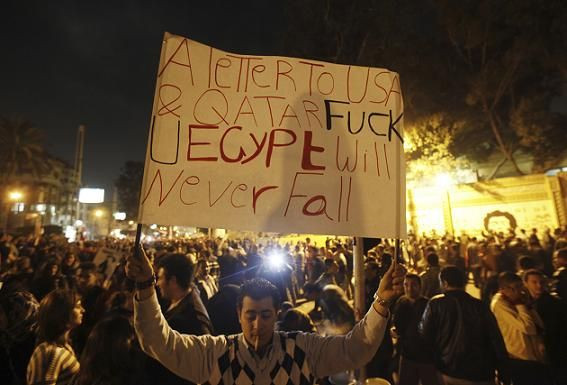Egypt Poised To Fall Into Vicious Cycle Of Economic And Political Crisis

Egypt is threatening to descend into a cycle of economic crisis feeding into political crisis and vice versa as the country’s leadership -- unable to implement economic policies it had acceded to with international creditors earlier in the year -- was forced to delay requesting a much-needed loan from the International Monetary Fund.
The economic brouhaha is one of the latest episodes in the saga of Egyptian President Mohamed Morsi, who has been literally besieged by opponents ever since he gave himself extraordinary executive powers on Nov. 22, looking to secure his grip over the country’s volatile political system ahead of a constitutional referendum.
Morsi has since rescinded those special powers. But foes have not been placated, and Morsi has had to give up more, turning back on austerity and market reform measures announced over the weekend that were also highly unpopular. Since those reforms were a precondition to a loan package of approximately $14.5 billion put together by the International Monetary Fund (IMF) and other international lenders earlier this year, the government was forced to delay officially asking for the cash.
The only problem: Egypt can ill afford such a move at the moment. In an effort to keep the currency from collapsing in international markets amid local political turmoil, the Egyptian central bank has been blowing through its foreign currency reserves, so much so it is estimated to have less than a three months’ supply. The resulting balance-of-payments crisis is adding to the economic uncertainty in the country.
"Every day that passes, the economy is probably in worse shape," Hisham Fahmy, executive director of the American Chamber of Commerce in Egypt, told the Wall Street Journal, adding it is "an indication that Egypt isn't stable and Egypt didn't deliver something that the IMF was looking for.”
According to the Financial Times, influential finance commentators inside the country are describing the economic decision-making inside the country as that of “a train without a driver.”
The fear now is that a deteriorating economic situation will add further fire to the political turmoil, causing a vicious cycle in a country that has seen little peace since overthrowing its decades-long dictatorship in 2010.
Optimists are hoping the exact opposite will happen, and that the delay of austerity measures that prompted the push-back on the loan will help smooth the political landscape. That would allow the government to pick up where it left off after the contentious referendum this month
"Of course the delay will have some economic impact, but we are discussing necessary measures (to address that) during the coming period," Finance Minister Mumtaz al-Said told Reuters, adding, "I am optimistic ... everything will be well, God willing."
However, even those inside Morsi's own party seem doubtful. Abdallah Sehatta, the chairman of the economic committee in the President’s Freedom and Justice Party, told the Journal the "government was very stupid because they chose a bad time" to implement and subsequently call off austerity measures and new taxes.
"They didn't open a discussion with the society. This was a big mistake," he added.
Outside the country, British-based banking giant HSBC Holdings PLC (NYSE:HBC) agreed, warning that further delay could seriously jeopardize Egypt's recovery.
© Copyright IBTimes 2025. All rights reserved.





















